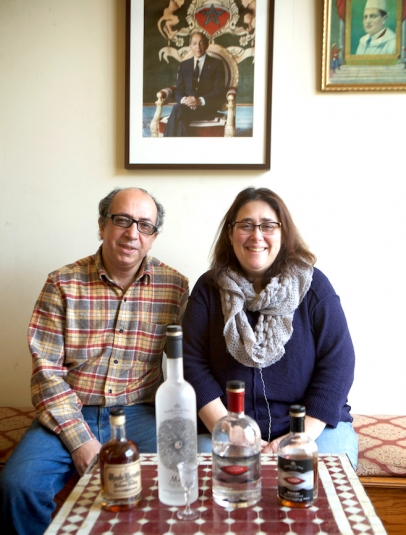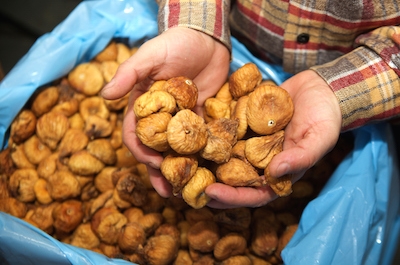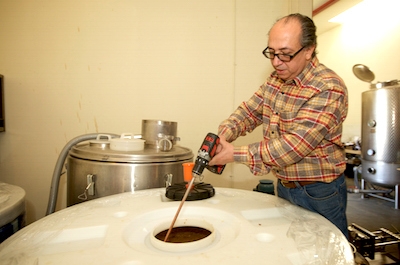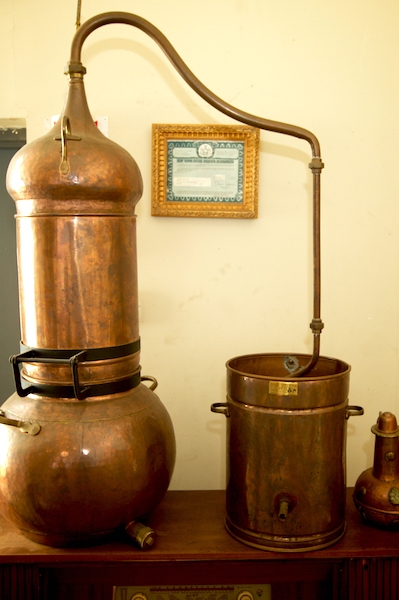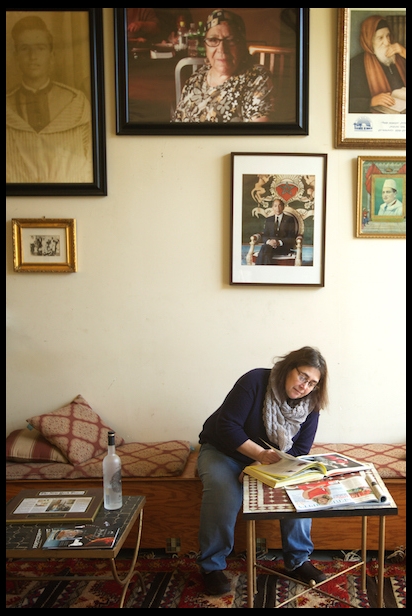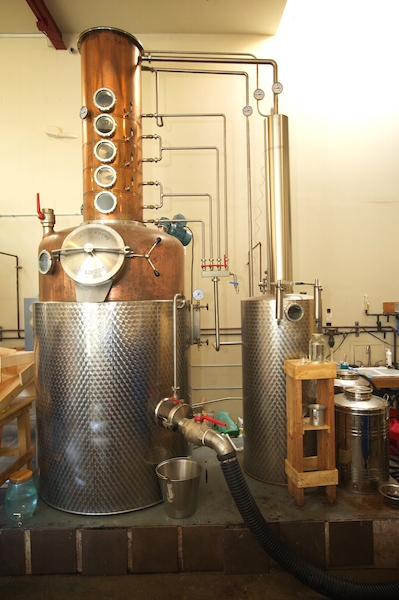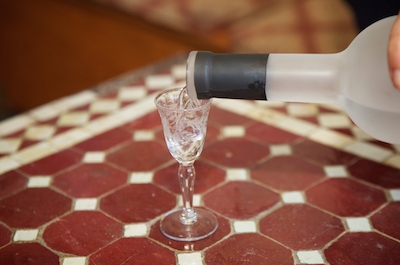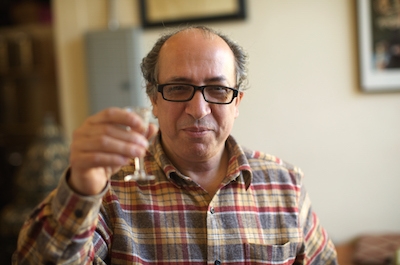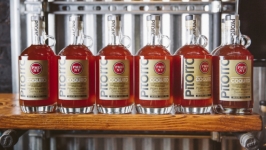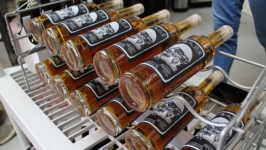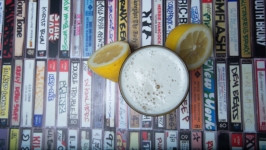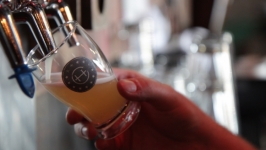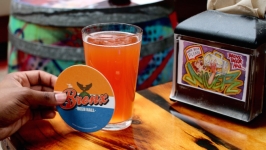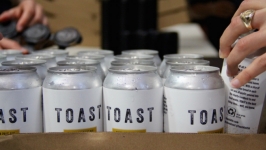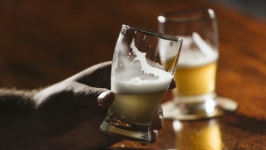A Shot of Peace
For David Nahmias, it’s the scent that’s followed him throughout his life.
Climbing a stepladder, he pries open the lid on one of the many 250-gallon vats in his distillery, attaches a mixer to an electric hand drill and turns it on. He points inside and says, “See all those bubbles? There’s life going on in there!” Upon closing the lid, he adds, “When my family would make this in the kitchen, I’d come home and just know what they were doing. Figs and yeast in water. It is a smell I’ve known for a long time.”
Dorit and David Nahmias are the co-founders and operators of Nahmias et Fils Distillery, producing mahia, the eau de vie of Moroccan Jewish tradition, distilled from fermented figs. The husband-and-wife team say they are the sole producers of mahia in the United States and are on a mission to popularize their artisan spirit the way vodka caught on upon its introduction to America in the 1960s.
An ancient and secretive tradition among Moroccan Jews, the making of mahia was passed down over the generations. Although the traditions of their Muslim neighbors did not include drinking alcohol, mahia created kinship as it was shared at celebrations in and around Casablanca. Said to have medicinal properties, it was enjoyed amongst everyone.
David laughs recalling stories from his childhood, “When I was about 12 or 14 years old, people would always ask me: ‘So, can my family get some more of your mahia? Even the police would come to our door asking! So, they’d order, my parents would make it, I secretly delivered! I guess you could say I was the young neighborhood alcohol dealer.”
However, as much of the Moroccan Jewish population fled to the United States and Israel, making mahia became nearly nonexistent. The Nahmias’ recipe was passed down to David from his mother, and he would make it in his home kitchen while working as a software developer. As the U.S. job economy shook down, and his parents both passed on, David Nahmias decided to attend classes at the American Distilling Institute in Kentucky and open up a distilling business.
Though apprehensive, Dorit, a former foreign exchange trader, founded the business after losing her own job.
“I learned a lot, but classes are not enough,” says David. “Only when you are actually making your product—learning to meet challenges and how to solve problems—that is always going to be the better way to learn… Before, I used to process information. Now, I just process!”
Their production and marketing happen at their distillery in industrial downtown Yonkers, New York. Dorit, manages the business and David serves as master distiller. Their facility is a space that illustrates much work, warmth and many personal touches: seating cushions, Moroccan rugs, framed family photos on the wall, a beautiful blue tile mosaic sitting table and, of course, boxes upon boxes of California figs.
“They have to be good figs,” David explains. “If they’re not, you will definitely taste it. Only good sugars from the figs will turn into good vapor.”
After crushing the figs thoroughly (with each 750-milliliter bottle requiring at least five pounds of figs), they are distilled with water, kosher yeast and some anise seed to enhance the flavor. All their mixtures ferment for two weeks, and then the liquid is twice-filtered to remove all impurities. The results are nothing short of the cleanest, smoothest, most subtly sweet and clear 80-proof firewater one might ever taste.
Tangibles from the history of the family’s mahia production are also present in their facility: a steel cooking pot on a nearby table, a copper still in the foyer appearing to be the smaller-but-older brother to a big kahuna of a German copper still in the back, able to contain 1,000 gallons. “You can taste the difference when you make it with all of them,” David says.
He has used each contraption for creating mahia at some point throughout his life, and many memories linger from each point on the long progressive timeline of Nahmias et Fils.
Many in the food and spirits world have taken great notice. Their growing orders from the past year have included world-renowned Chef Daniel Boulud and Disney’s Epcot Center. Dorit notes a significant achievement to date has been the distribution to Montreal, after three years of her tireless efforts. It has definitely been a shift of new energy from their beginnings selling to a small network of friends and families.
“We hustle all the time, and we’re still here,” she says. “Customer loyalty has been nothing short of amazing. We’re revitalizing a tradition, and bringing in something well-made and all-natural.”
Soon enough, they began to sell at farmers’ markets and would continue to hear people’s testimonials. “You see people’s reaction, you see their experience. No added sugar, no chemicals, the body takes to it very well. No hangover!” David says.
This much can be attributed to their philosophy of high quality over fast quantity. Having gone through many fermentation and tasting trials, they continue to carry out a commitment to a slow, organic approach. “Many people who make liquors on the market are looking to sell fast and cheap. Bad fermentation? You won’t see this here. You have to make sure everything is clean. You have to be disciplined to do this work.”
Nahmias et Fils continues to expand beyond mahia and have poured over into new products, including their Apple Brandy and Legs Diamond Whiskey, which was a finalist for the Good Food Award in 2016. All have presented more opportunities to connect with other local farmers and producers.
Ironically, it’s a within the concept mahia continues to serve.
“Nothing is ever guaranteed in life,” Dorit says. “But this is our work, and now something we get to pass down to our own children. Jews and Muslims were able to live together peacefully and celebrate with mahia. This is the ultimate representation of coexistence.”
Thus, perhaps what the world needs now is a sip of this elixir—which has been here, all along.


